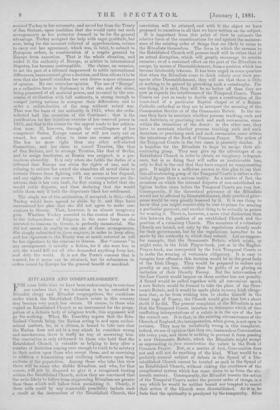THE GRECO-TURKISH ARBITRATION.
• WE can see no reason why Liberals should approve this new project of a European arbitration between Greece and Turkey. It was not Lord Granyille's idea, though he
may be compelled by stress of circumstances to accept it ; and unless it conceals some plan not suspected by the public, it has no perceptible merits of its own. As European Turkey is in process of liquidation, and Bosnia has been assigned to Austria, and the districts round Nish to Servia, and North and South Bulgaria to their inhabitants, and Duleigno to Monte- negro, Greece has a clear right to Epirus, Theeealy, Mace- donia, and the Islands inhabited by Greeks. . To please Europe, she consented, most unwisely, not to enforce her claim by arms, although at the moment of the fall of Plevna she might have established it by an expenditure of less than ten thousand men. Europe after the war being invested with full rights by the appeal of Turkey for protec- tion, to avoid future complications and to compensate Greece for her forbearance, awarded her a small part of her historic right, namely, the districts of Thessaly and Epirus scuth of latitude 40° N. This award was not made in the interest of Greece only, but to prevent a war in which, according to statesmen's calculations, Turkey in all human probability would cease to exist. Greece now asks that the award should be executed, threatening, if there is any further delay, to execute it for herself. She has raised 60,000 men, and her people are so excited that failure would be followed by revolu- tion. As Europe does not desire to see execution by that method, lest it should stir up insurrections or prematurely torininate the Sultanate, her duty is clearly to execute her own judgment, claim and receive the disputed district from the Sultan, and hand them over to Greece. Instead of doing this, France, under a nervous dread that peace might be dis- turbed, has proposed, and Europe, it is said, has agreed, that there should be an arbitration between Greece and Turkey, and is applying pressure to compel both Powers to submit. What is there to arbitrate about ? Europe has already stepped in as arbitrator, and has decided that it is best for the world that Greece should be content with a small portion of her rights,—and Greece has submitted. She has also decided that it is best for Turkey, which continues to exist only by her protection, that she should surrender this portion,—snd Turkey has not submitted. How will another arbitration affect that situation ? There can be but one real arbiter, Europe, and if she awards the territories to Greece, Turkey will not submit ; while if she does not award them, she annuls her previous decision out of deference to Turkey, thus establishing the prece- dent that it is not only safe, but profitable, to defy the European tribunal. The Judge declares that Smith owes Brown a pound, but as Smith declines to pay, makes a second decision that unless
Brown 'takes ten shillings, Brown shall go to prison There is neither justice nor common-sense in such a course, which must utterly destroy the moral authority of the tribunal, the obvious inference from its proceedings being that any suitor who loses his case has only to sneer at the Judge to modify his decree. It is suggested, indeed, that the resolution of Conference was only an opinion, that the arbi- tration will be the decree, and that Greece and Turkey will both obey it, because they will previously be " pledged "to do so ; but where is the ground for that opinion ? Turkey pledged herself to the Treaty of San Stefano, but never 'Kept it, appealing against it to an outside authority. She pledged herself to the Treaty of Berlin, but kept only its unavoidable clauses, neither Macedonia nor Armenia having received one of the promised concessions. She pledged herself to creditors who advanced her two hundred millions, and when it was con- venient repudiated their claims. Why should she keep her pledge to abide by arbitration, any more than previous pledges, un- less, indeed, force is to be used ; and if force is to be used, why not use it now, and carry out the original award ? Force, however, say the diplomatists, is "not to he used in any ease ;" and yet they expect that Turkey, which will not obey the existing award, because there is no force behind it, will obey a second award, although assured in advance that if she dis- obeys, nothing whatever will happen to her!
But, say the friends of Turkey, "It is most unjust that Europe should coerce the Sultan. Turkey is an independent Power, and Europe has no rights over her, either legal or moral." Very good. Then let Europe stand aside, tear up the Treaty of Berlin, and let Turkey settle with her enemies as she best can. If Europe has no rights over Turkey, neither has she any over Russia, and least of all has she a right to give Bosnia arbitrarily to an entirely foreign Power. The friends of Turkey cannot appeal to the rights of Europe whenever Turkey needs help, and deny them when- ever she is pressed to observe the conditions upon which help was granted. Europe, as we think unwisely and wrongfully, assisted Turkey in her extremity, and saved her from the Treaty of San Stefano, upon condition that she would carry out such arrangements as her protector deemed to be for the general advantage. Turkey accepted the help with eager gratitude, but now, being for the moment relieved of apprehensions, refuses to early out her agreement, which was, in brief, to submit to European orders, in consideration of a respite granted by Europe from execution. That is the whole situation, and under it the authority of Europe, as arbiter in international disputes, has become contemptible. She claims, on occasion, to act the part of a tribunal empowered to settle international differences, hears counsel, gives a decision, and then allows it to be seen that she herself considers her own decree a mere utterance of opinion. No one wants her opinion. The use of "Europe" as a collective force in diplomacy is that she, and she alone, being possessed of all material power, and invested by the con- sensus of civilisation with full authority, is strong enough to compel jarring nations to compose their differences, and to order a redistribution of the map without actual war. That was the basis of her authority in 1815, when she redis- tributed half the countries of the Continent ; that is the justification for her injurious exercise of her reserved power in 1878, and that is the reason for the appeal made to her arbitra- tion now. If, however, through the unwillingness of her component States, Europe cannot or Will not carry out an award, her moral claim to issue one ceases altogether. She has no more right than any other self-elected Committee, and her claim to cancel Treaties, like that of San Stefano, and to arrange Treaties, like that of Berlin, and to assign territories, as Bosnia was assigned, is a pre- tentious absurdity. It is only when she fulfils the duties of a .tribunal that Europe can claim the rights of one, and in refusing to enforce her award she abandons all moral claim to restrain Greece from fighting with any means at her disposal, a,nd, any rights She can secure. If the consequences are dis- astrous, that is her own fault, for first raising a belief that she would settle disputes, and then declaring that she would settle them only if both the disputants liked her settlement.
The single use of the arbitration, if accepted, is this,—that Turkey would have agreed to abide by it, and thus have surrendered her plea that she did not agree to make con- cessions to Greece. That, however, is an almost imaginary gain. Whether Turkey assented to the cession of Bosnia or to the independence of Bulgaria. in the same form as she assented to cessions to Greece, is perfectly immaterial. She did not assent in reality to any one of those arrangements. She simply submitted to ,Ibr'ee Inajeure, in order to keep alive, and her signature to the Treaty was as much extorted as will be her signature to the cessions to Greece. Her " consent " to any arrangement is morally a fiction, for if she were free to act, she would kill out all who demanded anything from her, and defy the world. It is not the Porte's consent that is ,wa,uted, for it never can be obtained, but its submission to .orders issued. by Europe for the general benefit of mankind.















































 Previous page
Previous page